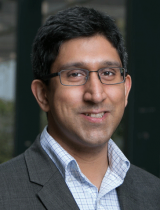ISyE Seminar Series: Anil Aswani
"Optimization Hierarchy for Fair Statistical Decision Problems"Presentation by Professor Anil Aswani Wednesday, February 12
|
|
About: Data-driven decision-making has drawn scrutiny from policy makers due to fears of potential discrimination, and a growing literature has begun to develop fair statistical techniques. However, these techniques are often specialized to one model context and based on ad-hoc arguments, which makes it difficult to perform theoretical analysis. This paper develops an optimization hierarchy for fair statistical decision problems. Because our hierarchy is based on the framework of statistical decision problems, this means it provides a systematic approach for developing and studying fair versions of hypothesis testing, decision-making, estimation, regression, and classification. We use the insight that qualitative definitions of fairness are equivalent to statistical independence between the output of a statistical technique and a random variable that measures attributes for which fairness is desired. We use this insight to construct an optimization hierarchy that lends itself to numerical computation, and we use tools from variational analysis and random set theory to prove that higher levels of this hierarchy lead to consistency in the sense that it asymptotically imposes this independence as a constraint in corresponding statistical decision problems. We demonstrate numerical effectiveness of our hierarchy using several data sets, and we conclude by using our hierarchy to fairly perform automated dosing of morphine. Paper link:
|
|
Bio: Anil Aswani is an associate professor in the department of industrial engineering and operations research (IEOR) at the University of California, at Berkeley. He received a BS in Electrical Engineering from the University of Michigan, in Ann Arbor, and a PhD in Electrical Engineering and Computer Sciences with Designated Emphasis in Computational and Genomic Biology from the University of California, at Berkeley. He has received an NSF CAREER award through the Operations Engineering program for his work on personalized healthcare, a Hellman Fellowship for his research on food insecurity, the Leon O. Chua award from Berkeley for outstanding achievement in an area of nonlinear science, and a William Pierskalla Runner-Up Award from the INFORMS Health Applications Society. His research interests include data-driven decision making, with particular emphasis on addressing inefficiencies and inequities in health systems and physical infrastructure. |
